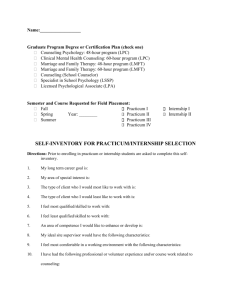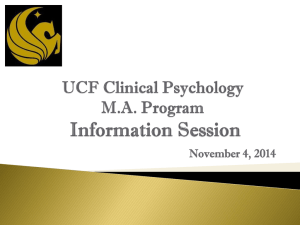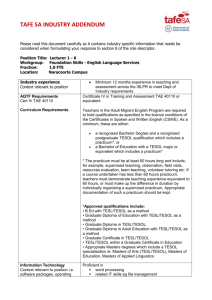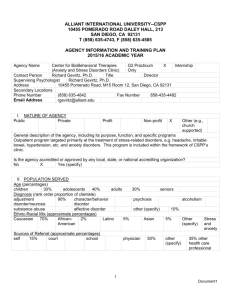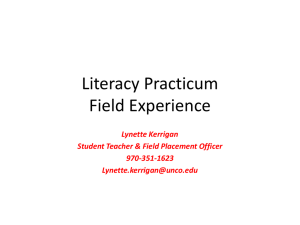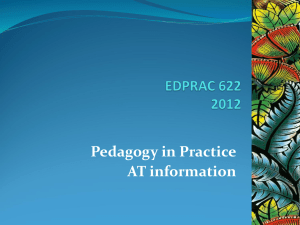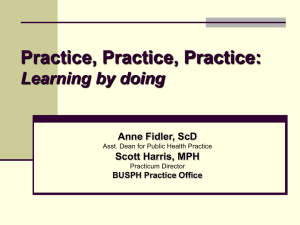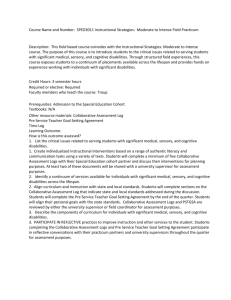Simulated interview
advertisement
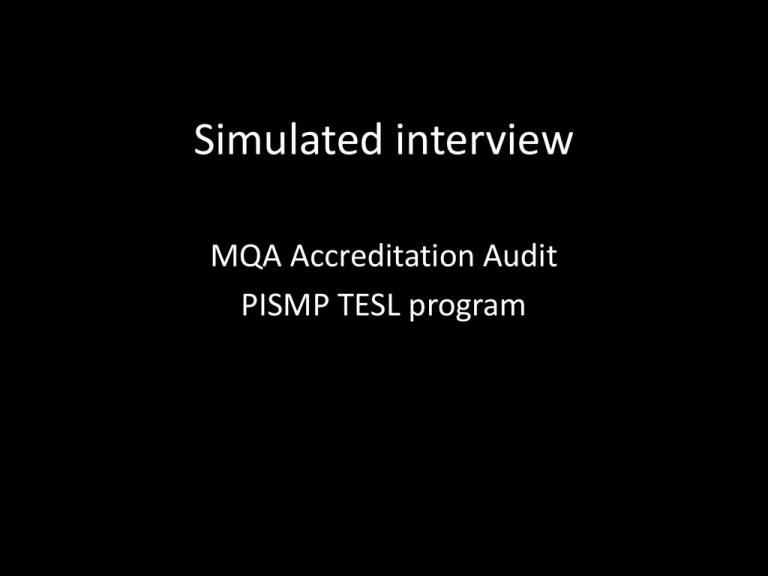
Simulated interview MQA Accreditation Audit PISMP TESL program What is the degree that you will receive after completing this course? • Ijazah Sarjana Muda Perguruan dengan Kepujian Pengajaran Bahasa Inggeris Sebagai Bahasa Kedua (TESL) Pendidikan Rendah • Bachelor of Teaching (Hons.) in the Teaching of English as a Second Language (TESL) for Primary Education What are the objectives of this programme? • Programme Educational Objectives • Seen in the future 1. Apply the knowledge and skills of teaching in schools, community, and environment. 2. Demonstrate the ability to engage in life-long learning. 3. Demonstrate the characteristics of an excellent teacher who is able to be an exemplar, who is ethical and competitive locally and globally. Complete the PEOs 4. Generate innovative solutions to problems in the Teaching of English as a Second Language (TESL) through research and problem solving. 5. Practise leadership qualities to create teamwork, the ability to communicate, and demonstrate moral, social and ethical responsibility. 6. Uphold Bahasa Melayu as a language of knowledge and strengthen the use of the English language to communicate competently. What kind of teacher will you be after completing this course? • Based on PEO / PLO • Keywords: 1. 2. 3. 4. Knowledge Model / apply Thinking skills Communicate/ cooperate 5. Team 6. Values 7. Life-long learning 8. Managerial/ entrepreneurial 9. Leadership PLOs 1. Use knowledge about the English language as well as knowledge and understanding of the theories and principles for the teaching and learning of English as a Second Language. 2. Model the correct and appropriate use of the English language and apply knowledge of pedagogical theories and principles to create learning experiences according to the level of pupils’ development. 3. Apply reflective practices, problem-solving skills, scientific skills, research skills and creative and critical thinking skills in the Teaching of English as a Second Language. PLOs 4. Communicate and cooperate effectively with various parties locally and globally. 5. Demonstrate the ability for, and show commitment and responsibility in working as a team. 6. Practise values, ethics, morality and professionalism in the teaching profession. PLOs 7. Recognise the need and capacity for continuous personal improvement by accessing, analysing and applying new knowledge to engage in life-long learning. 8. Demonstrate managerial and entrepreneurial skills in responding to current trends and changes in education. 9. Demonstrate responsibility in effective leadership. Entry / programme structure 1. 2. 3. 4. 5. 6. 7. How did you find out about this programme? How did you apply for it? Why did you choose to study in IPGKTAR? Describe the selection process. How long is the entire course? Tell me what this programme covers. How do the various components of the programme help you to become an English Language teacher? Entry / programme structure 8. How many credits in total will you accumulate over the entire course? 9. How many hours of learning time do you spend on a course? 10.What is the minimum level of achievement that you must reach to graduate? 11.What are the things that could cause you to be expelled or be dropped from this programme? Major 1. What are the TESL major courses that you have already taken so far? 2. What is your favourite course? Why? 3. Which course did you dislike? Why? 4. For a particular course: – – – – – – In which semester did you take it? How many credits is it worth? Which lecturer taught you this course? What did you learn in this course? (CLO) How were you assessed for the course? How will this help you become a good English Language teacher? Major 1. What is the ELT approach that English Language teachers are supposed to use in Malaysian schools? 2. How is the KSSR syllabus different from the KBSR syllabus? 3. What do you think of the introduction of Language Arts as part of the primary school English Language syllabus? 4. What are some of the current issues related to the teaching of English in Malaysia? Professional Practice 1. Tell me about your practicum. 2. How many times did the lecturers observe you? 3. What are the differences between the first, second and the third phase? 4. How is the internship different from the practicum? 5. Describe a typical practicum observation by a lecturer. Professional Practice 6. How are you assessed during the internship? 7. Give an example of when you applied what you learnt from one of your courses in actual teaching and learning during your practicum and internship. 8. How did practicum and internship prepare you for your future job? 9. What other courses and compulsory activities did you have during the semester that you had your practicum in? Professional Practice 10.In semester 7 you had 12 weeks of practicum which means you were away from the institute most of the time. How did you fulfill the 15 weeks of interaction that you are supposed to have for your other courses? 11.With all the things that you had to plan and carry out, and the extra hours of interaction, did you find it difficult to do the reading in preparation for classes, work on your assignments and so on? 12.With all this in mind, do you have any suggestions for improvements to the programme structure or content, especially your Major courses? Action Research 1. Tell me about your Action Research topic. 2. How is this Action Research related to the rest of your programme? 3. Who supervised you during your Action Research? How often did you meet, and what did you do during these meetings? 4. Tell me about your Action Research seminar. 5. Do you think it’s essential to have Action Research to prepare you to be an English Language teacher? Facilities & services 1. What are some of the facilities in IPGKTAR that are most directly related to your programme? 2. How do you find the library facilities in IPGKTAR? 3. How do you know the relevant references for a particular course? 4. Do you have any problems finding these references in the library? 5. What are the ICT- and internet- related facilities and services available to you? 6. If you fall ill, what help is available to you? Facilities & services 7. Who is your mentor? What do you usually do during your mentor-mentee sessions? 8. If you are facing any problems, who could you seek advice from? 9. How much are you given for your allowance per month? Are there any other allowances? How is this paid? 10.Do you need to pay to live in the hostel? Describe your hostel room and facilities. 11.Would you rather live elsewhere if given a choice? Why? Facilities & services 12.If you had any complaints or if you wish to make any suggestions about any aspect of the programme, what would you do? 13.Who are your Student Council representatives? 14.What role does the Student Council play? 15.What improvements would you like to suggest for the facilities and support services provided in IPGKTAR? Staff 1. Do you often ask questions in lectures and tutorials? Usually, how do the lecturers respond to your questions? 2. If you have any questions to ask a lecturer outside scheduled face to face interaction hours, how would you ask that question? 3. Do you think your lecturers give you a lot of freedom in managing your own learning? 4. Who is your favourite lecturer? Why? 5. Which lecturer did you dislike? Why? Future employment 1. Are you guaranteed a job after graduation? Do you get to choose where you will serve? 2. How do you feel about this? 3. If you fail to get a posting after graduation, what are your options? 4. What starting salary can you expect when you begin working? CPT/APTIS 1. What is your best achievement in the CPT/APTIS? 2. How is your CPT/APTIS result connected to your posting? Were you aware of this when you sat for the test? 3. What caused you not to do well in the test? 4. What has the institute done to help you improve your performance in the test?
